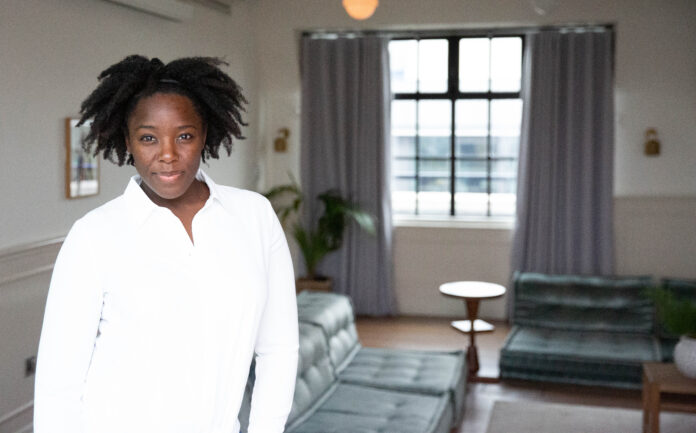Kimberley Wilson is on a mission to ensure that we look after that most complex of organs, the brain. Wilson wants us to develop a more holistic understanding of how to achieve and maintain mental health. Together spoke with her about the practical steps we can take.
Kimberley Wilson’s book ‘How to Build a Healthy Brain: Reduce stress, anxiety and depression and future-proof your brain’ is in many ways a manifesto; her book is a call to action at a personal and public-policy level to address the surge in mental health problems. The book isn’t just for those currently experiencing real difficulties, but for everyone. There are things all of us can do to make ourselves more resilient.
It is true that the pandemic and isolation experienced during the pandemic exacerbated this problem. However, over recent decades depression has already been on the rise. Depression results in impairments to our daily functioning, it results in less attendance in school or work, a deterioration in our relationships, it is complex and multifaceted. In Western countries suicides have become the major cause of death of those aged 15-29 after accidents. 
“We really need to move towards a more integrated and holistic understanding of mental health,” says Wilson. “My experience of working with psychological illnesses is that it is very disparate; there are mental health professionals over here, psychiatrists over there and everybody’s working in their own silos, treating the brain as a kind of disembodied entity that has nothing to do with the rest of the body. This means that we miss out on opportunities, in particular, early intervention and treatment, but also prevention.”
Age-related neurodegenerative disorders, such as Alzheimer’s disease, are also on the rise. The World Health Organisation estimates that by 2030 there will be 75 million people living with dementia. “When you ask people over 45 what is the health risk they are most frightened of, they will say dementia. However, The Lancet (the respected medical research journal), estimates that with lifestyle changes we could delay or even prevent 40% of global cases of dementia. So there’s an enormous amount that can be done, but a lot of people believe that dementia is just determined by genes and that it’s the luck of the draw.”
“We really need to move towards a more integrated and holistic understanding of mental health”
Wilson is a trained nutritionist, as well as being a Chartered Psychologist. She was also a finalist in the The Great British Bake Off, a hugely popular programme in the UK. When I ask her what are the most important changes we can make to our diet to improve brain health, she says that evidence suggests that leafy green vegetables are really important, “just a handful of spinach, rocket or kale, or dark green cabbage with whatever your eating, maybe berries a few times a week. An adequate intake of omega three fatty acids through two or three servings of oily fish, such as trout, salmon or sardines, every week; and, fibre.”
“Not a single age group in the UK or the US is meeting their fibre requirements,” says Wilson. “We know that when the gut’s microbiome breaks down fibre it produces compounds that protect the gut’s lining and the gut-brain barrier as well. It prevents potentially toxic and harmful substances from crossing into the bloodstream and reaching the brain.” However, she acknowledges that there is still a lot we don’t know about.
“We know that when the gut’s microbiome breaks down fibre it produces compounds that protect the gut’s lining and the gut-brain barrier as well”
Wilson’s book is very much based on available research. At the start of the book she has a chapter on research and how the media overstates the findings of research; there’s also a chapter entitled ‘getting to know the brain’ – which goes over some basic physiology. In the foreword, she says you don’t have to read these chapters, but I found that they were a useful backdrop to the book. When I said that I appreciated the measured language used throughout the book she said she was glad to hear it: “I really want to be careful not to make sensationalist claims. I know that big, punchy claims drive sales, but I don’t want people to have a poor understanding of mental illness, it’s a disservice to patients to oversimplify too much.
“I think that we need to understand that something like depression, for example, is complex and multifaceted. For some people driving factors will be diet and lifestyle, but for many it won’t. What I propose is a third way where we look at lifestyle support alongside therapy or medication.”
Wilson’s also keen that we don’t give ammunition to those who think that it’s all in our own hands and that there aren’t wider societal problems at work: “Intervention studies have shown that giving people just a little more money can reduce the risk of depression. It’s not just that it eases the burden of paying bills, but it also means people can afford more nutritious food or that there’s just less family stress.
“Experiences of trauma, your experience of prejudice, poverty or the ability to recover or manage these are often outside of an individual’s control. So much is about public policy: making sure that children born into poorer families have access to good education, access to good healthcare – including properly funded early intervention. I’m not against personal responsibility, but we need to understand that our life status and standard of living play a huge part as well.”
The book goes through many areas where we could improve our brain’s resilience and each chapter is concluded with a list of ‘takeaways’ that summarize the main changes we could make. The chapters deal with everything from sleep to social media use. The approach is more informative than didactic.
“we should try to increase our physical activity, even short bursts of activity can be supportive”
I ask Wilson what are the top three things we could do in our lives to future proof our brains. “I think the most robust evidence base we have is for physical activity, both aerobic activity and resistance training. It reduces the risk of depression and is one of the best interventions for reducing your risk of dementia. So we should try to increase our physical activity, even short bursts of activity can be supportive. Secondly, managing your blood glucose levels to prevent pre-diabetes and diabetes, research shows that high blood sugar can significantly increase your risk of Alzheimer’s and dementia. Insulin resistance may also be associated with depression.
“But it’s not all about eating berries and physical activity, it’s important to say that your long term wellbeing and even your longevity is strongly linked to the quality of your relationships. It’s really important that we understand that our nervous systems depend on other people. We’re not made to deal with stress, pressure, pain, or trauma by ourselves. We need other people to support us and help us regulate our emotions. It’s not always easy, but where we can it’s really important to build up connections. I know it’s not always easy in big cities, but joining a book club or choir, for example, can help.”
Finally, as someone who was a Bake Off finalist, I ask if we can still eat cake. “Intervention studies found that people can improve their diet and still eat sweet things every other day. You don’t just have to pile through raw vegetables, that’s no way to live! Food is about nutrition and taking care of yourself, but it’s also about pleasure and catching up with your best friend over a pizza.”
Wilson has recently published a further book, Unprocessed: How the Food We Eat is Fuelling our Mental Health Crisis (2023). She can also be found on Instagram, for regular updates on the latest research and top tips: @foodandpsych
www.kimberleywilson.co







